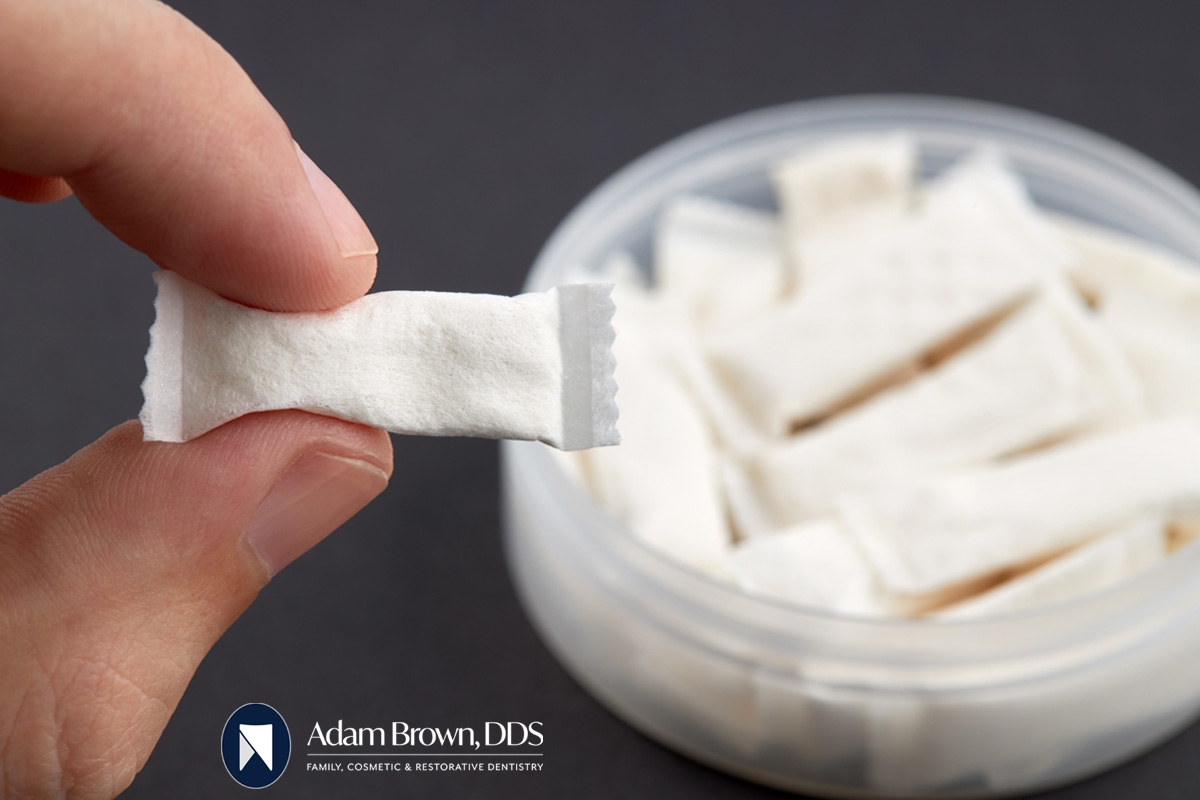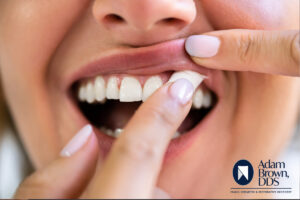
To Zyn or Not To Zyn: Addressing the Nicotine Pouch Craze
Nicotine pouches, whether a Zyn, an On!, or a Rogue (to name a few common brands), have become incredibly popular lately. Individuals wanting to quit smoking, or even those simply looking for a mid-day jolt, find the small, seemingly innocuous pouches a pleasing substitute for coffee and/or cigarettes. But how safe are these oral pouches–is it a good idea to keep them wedged between the gums and lip for long periods of time? Though there is not a lot of research that has been done on this new phenomenon, we can take an honest look at the effects of nicotine on the body, specifically one’s oral health.
Nicotine pouches, those made by any of the three companies named above, as well as the plethora of other companies hopping on the bandwagon, are a tobacco-free product that is meant to be held between the user’s lip and gum area. Each pouch delivers nicotine to the body as it absorbs through the mucous membranes in the mouth, which then allows it to enter into the bloodstream. These pouches are a similar concept to the popular smokeless tobacco products, such as Snus.
Snus pouches have been popular for years as a substitute for smoking since they contain both nicotine and tobacco, however, straight nicotine pouches seem to be replacing products like Snus since Zyn, On!, etc. carry the same or similar effect but without the dangerous side effects caused by tobacco.
Nicotine pouches are made mostly of nicotine and water. Each pouch is approximately 80%-90% water and microcrystalline cellulose, which acts as the non-tobacco filler. Other ingredients include additives and flavorings, both at the acceptable food-grade standard. These include mint and coffee flavors, among others, and most nicotine pouch brands also contain artificial sweeteners rather than sugars, which helps prevent tooth decay. And, since there is no combustion or tobacco leaf included, nicotine pouches are viewed to be a likely substantially lower-risk product than tobacco smoking (as well as tobacco pouches and loose tobacco). This said, there is presently not enough evidence to evaluate the true oral effects of such a product, at least beyond the knowledge we already have of the addictive nature of nicotine.
Even though nicotine is highly addictive to most users, it has been used in oral forms for a long time. Nicotine lozenges, gums, and even mouth sprays have been used for over 40 years as a mechanism for smoking cessation. According to research published by the British Dental Journal, there has been no reported evidence that nicotine alone can increase oral disease (cancers, periodontal). What’s more, studies have shown that nicotine can have angiogenic effects on the body when ingested, meaning that it can grow new blood vessels, which is the direct opposite of what tobacco does. So, theoretically, ingesting nicotine could advance the body’s wound-healing capabilities. On the other hand, it could also encourage the growth of existing tumors within the body–though presently there is no hard evidence of this.
What we do know for sure is that despite its addictive nature, nicotine pouches are commonly viewed as a healthy substitute for smoking and chewing tobacco. The prolonged and regular use of pouches like Zyns may give an increased risk of oral health problems, but at this time further research is needed to provide hard evidence of such.
Receding Gums
Aside from the chemical effects of using nicotine pouches, what about the mere presence of a foreign substance in your mouth, resting between the teeth and gums, this can’t be good for your gums, right? Most nicotine pouch brands suggest keeping the pouch in your mouth for up to an hour, which can cause the gums to start receding, allowing for the possibility of all sorts of oral health issues. Gum disease can come in many forms, but most often it shows as gingivitis or (the more serious of the two) periodontal disease. Both can have serious side effects and can happen to anyone. Luckily, gum disease is preventable, and if you enjoy using nicotine pouches regularly, or even every now and again, knowing the differences between gingivitis and periodontal disease, paired with how to avoid them, will help you to maintain proper oral health.

To begin, it’s crucial to know what gum disease looks like. The typical signs of gingivitis are irritated, red gums that tend to bleed easily (even with the use of a soft-bristled toothbrush). Though gingivitis is a milder form of the disease, if it is not treated properly it can lead to a more mature form of gum disease—periodontitis—which is flagged by inflammation and deep infection that eats away at the gums and teeth (the ligaments, sockets and all), so definitely something to consider.
The positive news is that both types of gum disease are treatable, even preventable when proper hygienic procedures are regularly performed. If you are experiencing sensitive and/or inflamed gums, especially if you are using nicotine pouches, your best bet is to come in for an examination right away. At Adam Brown, DDS we can accurately evaluate the health level of your gums by taking measurements, even x-rays of the jaw if needed. Once we make an assessment, we then begin to develop a plan for treating and eliminating the problem areas. During an examination, your dental professional will evaluate the health of your gums and measure any pockets that may have formed around your teeth. He may also order x-rays to determine the health of your jaw. From there, he will develop a treatment plan and recommend prevention methods, and he may advise you to stop using the pouches for a while to see if they were a part of the problem.
Treatment methods for gum disease depend upon how far the condition has progressed. While this first stage of gum disease usually gets better or reverses after a professional cleaning, proper oral hygiene must be continued at home, or the condition can easily and quickly return. So be prepared to pause–or completely eliminate–your usage of nicotine pouches.
When caught early, gum disease can usually be treated before tooth loss occurs. But, even better than catching it early, is to prevent it altogether. Good and consistent at-home oral care (brushing and flossing) and regular dental checkups and cleanings can go a long way to help keep your gums healthy and disease-free. And, if you are using the pouches, pay close attention to your oral health: are sores all of a sudden showing up in your mouth? Are your teeth and gums more sensitive than they usually are? These could be quick signs that maybe you should choose not to Zyn for the sake of your health.
For now, since we have so little evidence of the effects of nicotine pouches, we advise proceeding with caution, and if you begin to have any sign of negative changes within your mouth to stop completely.
